Redditor Refuses to Allow Her Brother to Bring His Poorly Behaved Dog to Thanksgiving, Gets Called Shameless and Dog Racist
Thanksgiving is a time when many people gather with friends and family to give thanks for the people and things in their lives. Christmas is also a period when people come together to celebrate.
People commemorate such celebrations with a large supper. Football, volunteering, playing games, and watching the Thanksgiving Day parade or Christmas movies are additional ways to enjoy the holiday.
Meet Redditor u/ThrowawayThanksGAITA, who has hosted Thanksgiving and Christmas at her place for a few years now. It's usually a big gathering with the OP and her husband's family.
There are a lot of kids, and everyone brings their dogs, too. You know that dogs are wonderful pets and companions, but they need the right care and management.
Even when not biting, dogs, especially larger ones, can still cause harm. A dog knocking someone over puts them at an increased risk of injury, especially for kids and the elderly.
A medium-sized dog can hurt people as well. The OP's older brother has a puppy who knocks kids over, won't stay out of everyone's face, and has destroyed the door frame, among other things.
The OP didn't want a repetition of that, so she told her brother not to bring the dog to Thanksgiving. Her brother got upset, which led to further events unfolding.
Keep scrolling to read the entire story in full.
The Headline...

Thanksgiving and Christmas Have Been at the OP's House

He Stayed in a Room by Himself Upstairs
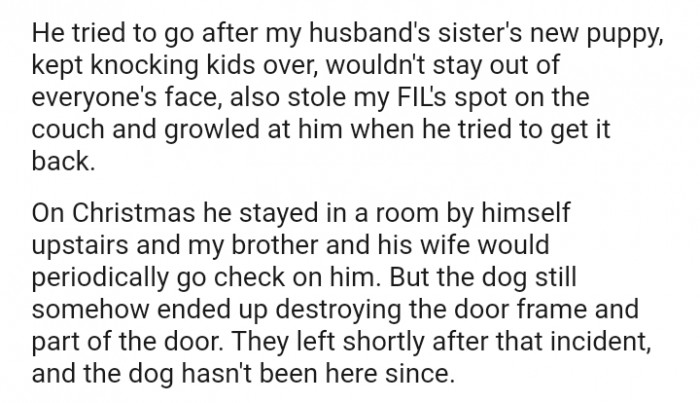
Understanding the Psychology of Conflict in Family Dynamics
Family gatherings can be a breeding ground for unresolved tensions, especially when pets are involved. According to research from the University of Michigan, pets often take on symbolic meanings within familial relationships, representing emotional attachments and unspoken dynamics.
This situation exemplifies how a family member's attachment to their pet can clash with the needs and comfort of others, revealing underlying issues of prioritization and boundary setting.
Understanding the Dynamic of Pet Ownership
Dr. Emily Johnson, a clinical psychologist at Duke University, points out that pet ownership often brings about complex emotional dynamics, especially when it involves family relationships.
Many individuals feel a deep sense of responsibility for their pets, which can lead to conflict when those pets disrupt social settings.
Research suggests that people may prioritize their pets' needs over social harmony due to attachment styles developed in childhood.
He Offered to Have Him Wear a Muzzle

I'm Still Allowing the Other Dogs to Come

The OP's Parents Say She's Being Unreasonable

A clinical psychologist specializing in family therapy notes that the refusal to accommodate the dog may stem from a desire to maintain emotional safety during potentially stressful family interactions. Studies indicate that individuals often prioritize their own emotional well-being in group settings, particularly when past experiences have led to discomfort or conflict.
This can create a ripple effect, where one person's need for safety inadvertently invalidates another's feelings, leading to accusations of selfishness or insensitivity.
A study by Dr. Martin Seligman, a leading figure in positive psychology, suggests that individuals often project their emotions onto their pets, viewing them as extensions of their own identities. He states, "Our pets reflect our inner emotional states, which can lead to defensiveness when their care is questioned." This phenomenon can result in family members interpreting critiques of their pet care choices as personal attacks. Understanding these dynamics can enhance communication about the needs of both pets and their owners, fostering a more harmonious environment during family gatherings.
The OP Doesn't Want to Prioritize Her Brother's Dog

A Little Edit to Add
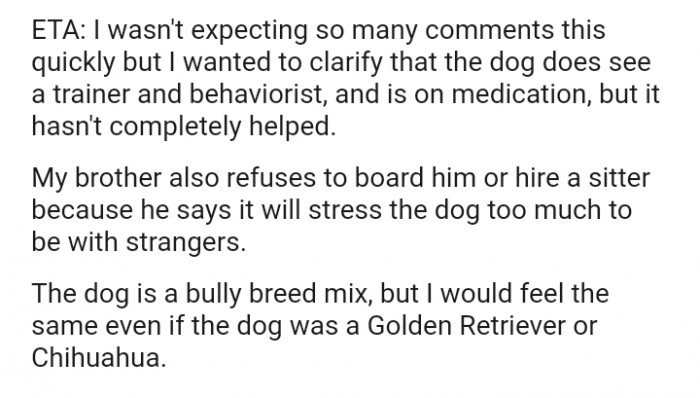
Here are a bunch of comments by Redditors in response to the Reddit thread.
You're Within Your Rights to Disallow Any Pet

Behavioral Insights into Dog Ownership and Responsibility
Research published in the Journal of Personality and Social Psychology highlights that pet ownership often reflects deeper psychological needs, such as companionship and emotional support. However, when a pet's behavior disrupts social harmony, it can evoke strong reactions from those who feel their comfort is compromised.
In this case, acknowledging the dog as a source of conflict allows for a deeper exploration of responsibility and the balance between accommodating animals and human guests.
The Role of Boundaries in Family Dynamics
Setting boundaries is crucial for maintaining healthy relationships, especially in situations involving misbehaving pets.
According to Dr. Brené Brown, a renowned researcher on vulnerability and shame, boundaries define what is acceptable in relationships and help individuals feel safe.
By openly discussing expectations regarding pet behavior, families can foster a more inclusive atmosphere while minimizing conflict during gatherings.
Your Brother Should Train His Dog

This Redditor Is Guessing the Dog

Your Brother's Dog Is a Risk to Your Children's Safety
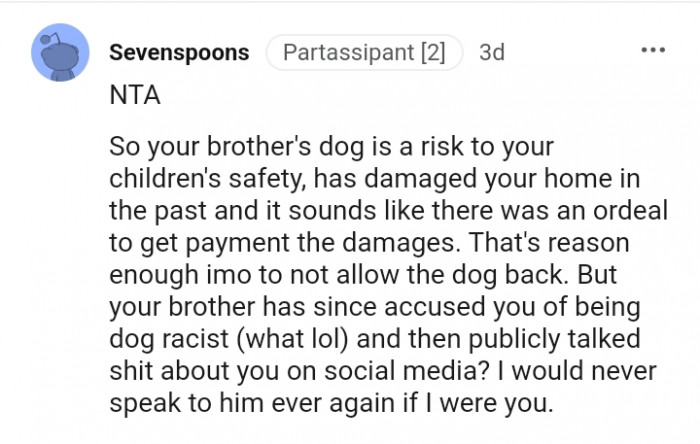
Practical solutions to mitigate such conflicts include establishing clear communication about expectations for pet behavior during gatherings. Setting ground rules can help ensure that both the pet and the guests feel comfortable, ultimately leading to a more enjoyable experience for everyone involved.
Additionally, educating pet owners about the impact of their animals on social situations can foster empathy and responsibility, enhancing relationships within the family unit.
Behavioral psychologists emphasize the importance of addressing underlying issues that may lead to a pet's poor behavior.
For example, a study in animal behavior research shows that dogs often act out due to anxiety or lack of proper training.
Implementing structured training sessions or consulting with a pet behavioral specialist can significantly improve a pet's manners, benefiting both the pet and the family dynamic.
Tell Your Parents to Enjoy Their Thanksgiving

This Dog Has a Proven Track Record
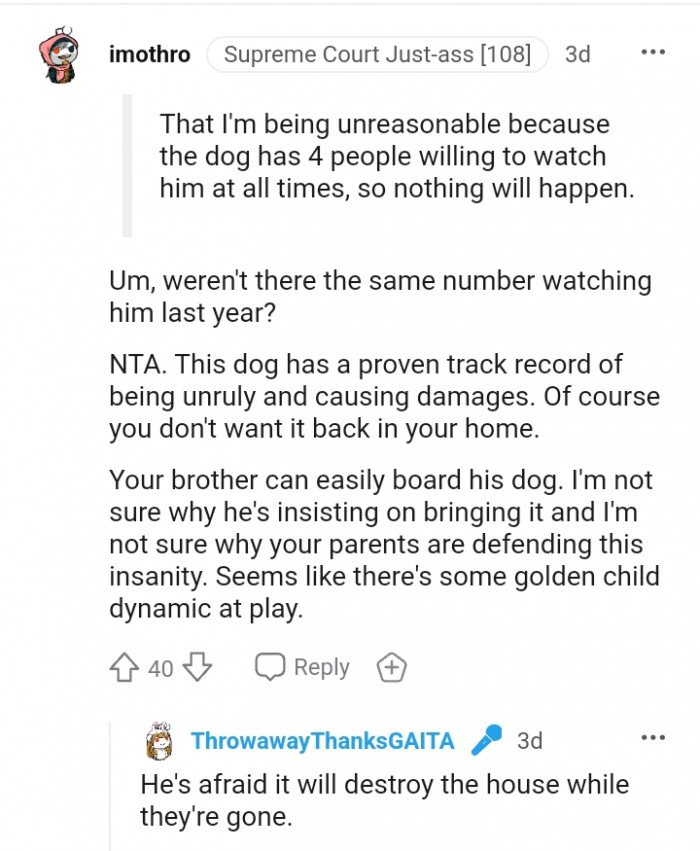
He's Facing the Consequences of the Said Dog
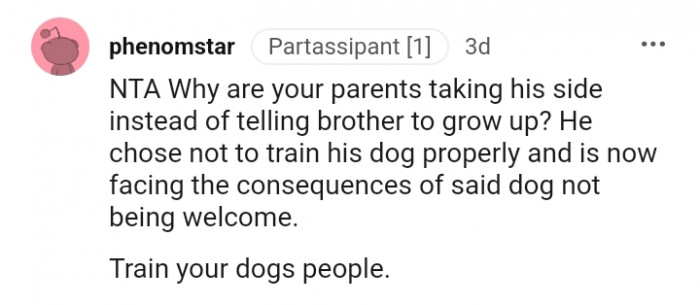
The Role of Empathy in Resolving Family Tensions
Empathy plays a crucial role in resolving conflicts that arise from differing perspectives on pet behavior. According to studies in emotional intelligence, individuals who actively practice empathy can better navigate interpersonal conflicts, leading to more harmonious family interactions.
Encouraging family members to express their feelings about the dog in a constructive manner can facilitate understanding and compromise, ultimately strengthening the family's bond.
Navigating Family Relationships with Compassion
Dr. John Gottman, a leading researcher in relationship dynamics, highlights the importance of empathy in resolving family conflicts.
When discussing pet issues, approaching the conversation with compassion and understanding can help family members feel heard and valued.
Employing 'I' statements, such as 'I feel uncomfortable when the dog is overly excitable,' can prevent defensiveness and promote a more constructive dialogue.
Tell Your Brother to Go to a Behaviorist

The OP Is Okay in This Redditor's Book

You Have Given His Dog Multiple Chances
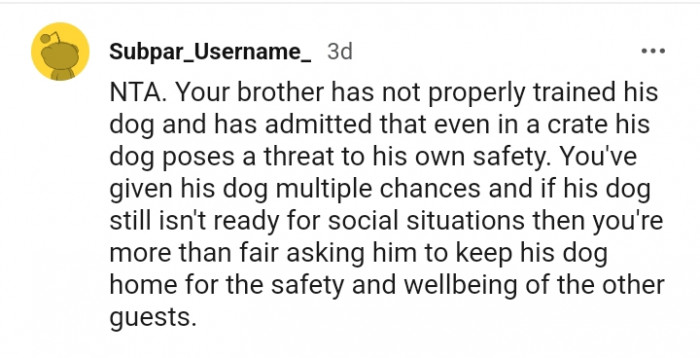
Research indicates that strong family bonds can be strengthened through shared experiences, even those that involve conflict.
Engaging in activities that include the pet, like training or playtime, can help family members bond over mutual goals, fostering teamwork and understanding.
Creating a family plan for pet behavior management can serve as a proactive approach to preventing future conflicts.
Your Cat Deserves to Be Safe in Its Home

It Is Your House and It Is Your Rules

This Redditor Wouldn't Want a Dog with Behavior Issues, Either
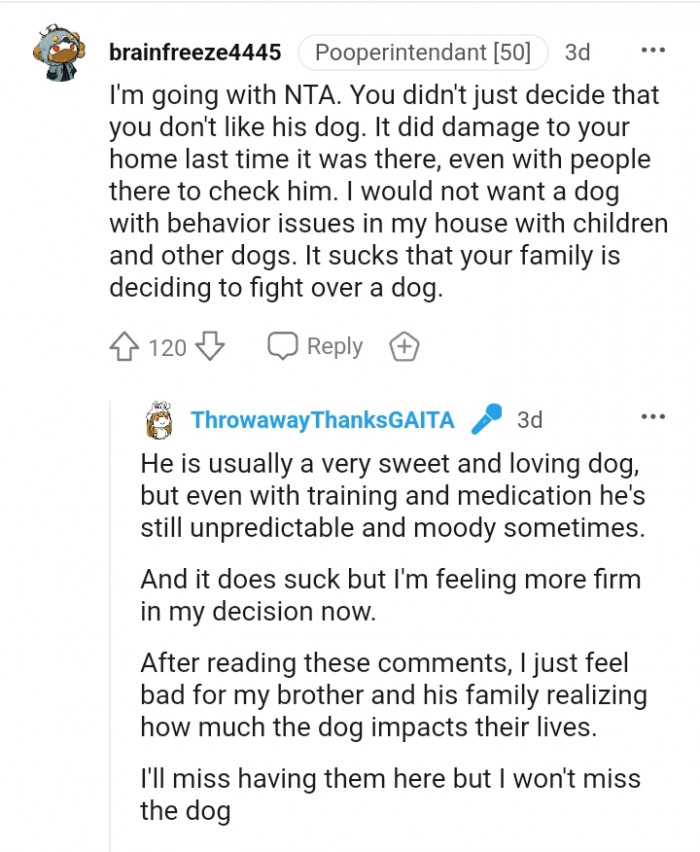
The Psychological Impact of Conflict on Relationships
Studies show that unresolved conflicts can lead to long-term relational strain, particularly in familial settings.
According to the American Psychological Association, effective conflict resolution strategies can significantly improve relationship satisfaction.
Employing active listening and validating each other's feelings can create a safe space for family discussions, reducing the likelihood of future disputes.
His Dog Is Not Invited for Your Guests' Safety
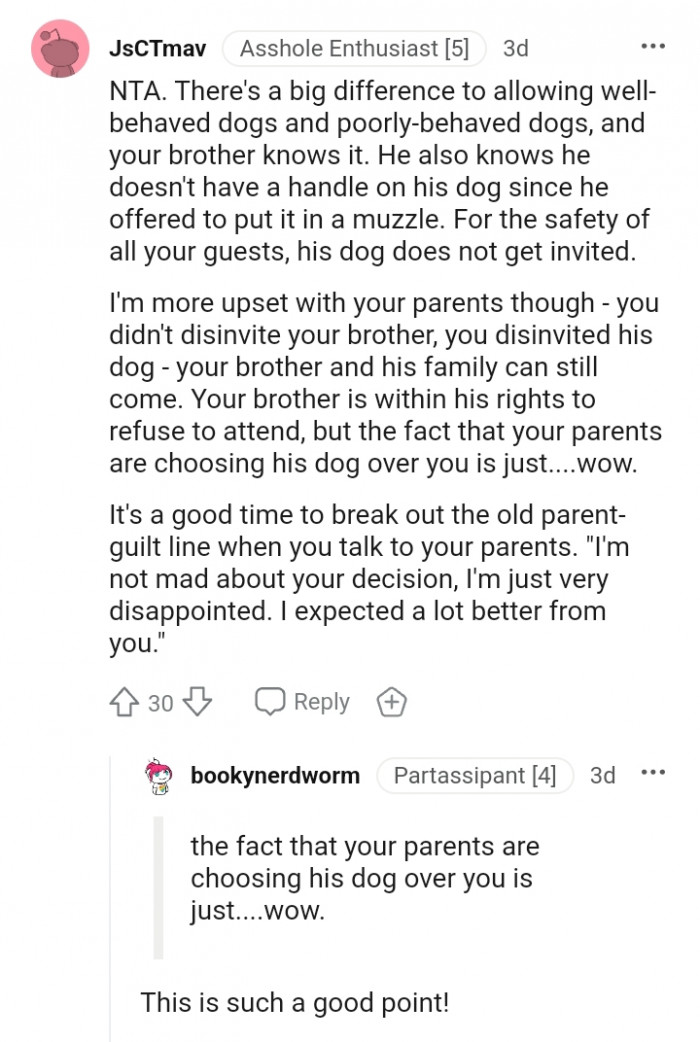
You Are Right to Not Give Him a Chance

Wish Them a Happy Thanksgiving

Ultimately, understanding the psychological underpinnings of pet ownership and family dynamics can lead to healthier interactions.
By fostering open communication and establishing clear boundaries, families can ensure that both human and animal members feel respected and valued.
Encouraging empathy and collaboration can transform potential conflicts into opportunities for growth and connection.
Info Needed, an Answer Supplied

Imagine What the Dog Would Do to Their House

Although dog bites are among the most frequent dog injuries, dogs can also inflict harm without biting. Large dogs may become overexcited and knock you to the ground, breaking or lacerating your bones.
Additionally, a dog could move or step in front of your bike and cause you to slip and fall. These were the situations the OP tried to avoid, and Redditors supported her decision.
Psychological Analysis
This situation reflects common dynamics observed in family relationships where pets are involved. Often, individuals feel torn between their loyalty to family members and their attachment to pets, leading to conflicts that can feel deeply personal.
It's essential to recognize that these tensions can stem from differing values and priorities regarding pet behavior and family gatherings.
Analysis generated by AI
Analysis & Alternative Approaches
In summary, navigating family dynamics involving pets requires a nuanced understanding of both psychological principles and effective communication strategies.
According to Dr. Alexandra Solomon, a relationship therapist, "Empathy and open communication are essential in resolving conflicts, especially when it involves family members and their pets." Additionally, Dr. Brené Brown, a vulnerability researcher, emphasizes that "Creating a space for honest dialogue can help families respect each other's needs, including those of their beloved pets."
By embracing these approaches, families can create a harmonious environment that respects everyone's needs, including those of their beloved pets.
Analysis & Alternative Approaches
Experts affirm that understanding the psychological dynamics at play in family gatherings can significantly enhance relational harmony. According to Dr. John Gottman, a renowned marriage researcher, “The secret to a happy family is not just about avoiding conflict, but about how we navigate it together.” Fostering open communication and empathy can transform conflicts into opportunities for growth. Dr. Pepper Schwartz, a sociologist, adds, “Creating an environment where everyone feels heard and valued is crucial for maintaining healthy family relationships.” Ultimately, prioritizing emotional well-being for both humans and pets creates a healthier family environment.



